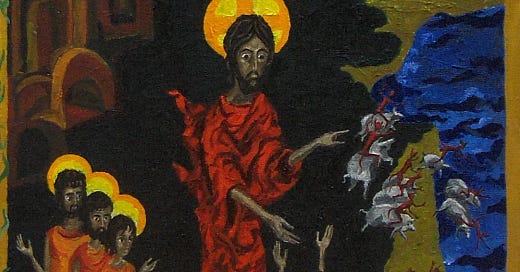The one with the demon pigs...
(Free Version)- Proper 7, Year C, Isaiah 65:1-9, Galatians 3:23-29; Luke 8:26-39
You can find this week’s readings here.
We have entered into the season after Pentecost, which is often called “Ordinary Time.” Ordinary Time is the season where we learn how to walk with Jesus by the Spirit. We hear stories about what Jesus taught and did. We are reminded that the Spirit is with us in the messiness of life.
Ordinary Time has two “Tracks” for the first (Old Testament) reading. “Track 1” follows one of the great narrative arcs of scripture. This year, we hear stories of Israel’s kings, and also from the minor prophets. “Track 2” is more thematic, directly tied in some way to the gospel reading. Three years ago, we walked down Track 1. This year, we will do Track 2. If you are looking for Track 1, you can find the longer version and the short version here.
Life is messy. We live in a world that is messy. Each of our lives are messy as are those in our congregations. Many of us are grieving. Many of us are conflicted. Some of us are bored, dissatisfied, anxious, afraid. And yet God is not afraid of the mess. He is with us in the midst of it. His presence may sound like silence, but he is there, preparing us, forming us by his presence.
It is not only our individual lives that are messy. Our world is full of polarization, tribalism, and fear of the “other.” We are facing multiple wars and economic uncertainty which each add layers of anxiety to an already chronically anxious culture.
Our fears are legitimate, and Christ meets us in the pain of what we experience. Though our concerns about our world are legitimate, we must never forget that our God is not afraid of the chaos. He runs to it.
In our Old Testament (Track 2) reading (Isaiah 65:1-9), God responds to his people, those who have blamed him and his apparent absence for all of their difficulties. Through the prophet, God responds to them by saying that he has always been near to them; but they are looking for him in the wrong places. They are more interested in things which can provide them control: consulting other Gods, offering sacrifices to them, living in ways counter to how he has led them. In all of it, they then brag about their own piety and they separate themselves from others! Because of this, they will receive the fruit of their idolatry. The ways of the false gods do not lead to health and flourishing. Still, God will not let go of Israel. He will be faithful to his covenant and Israel will survive even their own folly.
In our gospel reading (Luke 8:26-39), the Gerasene demoniac has been oppressed by a certain kind of pseudo-freedom. He can consistently break any chains which hold him and he is not bound by the social conventions of being part of human community (he runs around naked, after all!). He is isolated, wandering among the tombs. Even though he is “in solitary places,” he is plagued by a “legion,” a demonic community which has bound him and defined him. These dual oppressions (individual freedom and the oppressive demonic community) have created a discordant mess in his life. Jesus sets him free from both the pseudo-freedom of isolation and the pseudo-connectedness of the demonic community.
Neither Israel nor the demoniac are left comfortable at the end of our readings. The previously-captive man has been fully liberated, yes. And, yes, God will always be near to his people. This is good news. And, with the good news, comes an unsettling, a challenging, a nudging.
The previously-captive man is not to remain comfortable in his liberation. He is not to attach himself to Jesus’ hip, but to go back home and tell his story.
This move towards the “other” is present in our epistle reading (Galatians 3:23-29). Paul declares that the doors of God’s family have swung wide open to people from all ethnicities and backgrounds. All those who are in Christ are children of God. We are not defined by our ethnicity or any other narrative by which we could “earn” such status. Baptism is now our primary marker (vs. 27). It is being in him which ultimately tells us who we are. This does not mean that we no longer carry those identities, but that we are in-Christ before we are anything else.
Like Israel, like the man-set-free, and like Paul, God’s people, led by his Spirit, are called to run to the chaos, not away from it. We are called to sit with people’s fears, to go to those who are often seen as untouchable, to love our enemies, and to listen with both ears wide open. Because, even when we worshipped weird things in weird ways with broken motives, God has been with us.
On our own, we are unable to heal ourselves or our world. No amount of convincing, debating or creativity will do it. The Church is called to remind the world that God is here. We are called to proclaim freedom to those who are held captive by other stories. We are called to sit with those who grieve that the world is not how it should be. We are called to forgive and to love our enemies. Amen.




